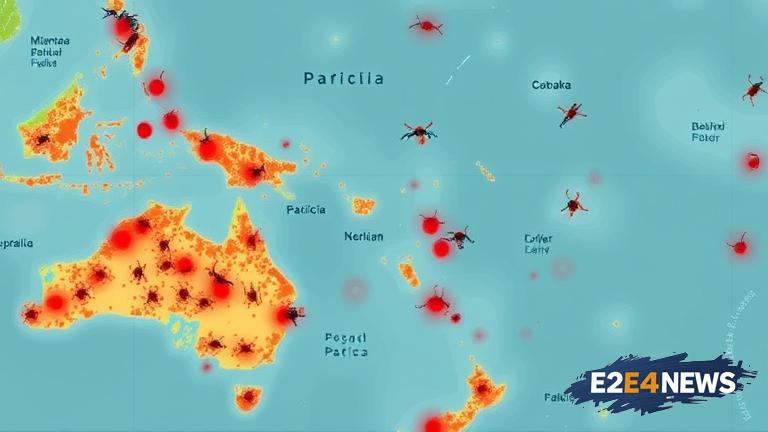Dengue fever is a serious health concern that has been affecting the Pacific region for several years. The illness is caused by a virus that is transmitted through the bite of an infected mosquito, and it can cause a range of symptoms including fever, headache, and joint pain. In severe cases, dengue fever can lead to hemorrhaging, shock, and even death. The Pacific region is particularly vulnerable to dengue fever due to its tropical climate and the presence of the Aedes mosquito, which is the primary vector of the disease. Several countries in the region, including Fiji, Samoa, and Tonga, have reported outbreaks of dengue fever in recent years. The outbreaks have been linked to a number of factors, including poor sanitation, inadequate waste management, and a lack of effective mosquito control measures. The World Health Organization (WHO) has warned that the Pacific region is at high risk of dengue fever outbreaks due to its geographical location and the presence of the Aedes mosquito. The WHO has also emphasized the need for countries in the region to take proactive measures to prevent and control the spread of the disease. This includes implementing effective mosquito control measures, improving sanitation and waste management, and promoting public awareness and education about the risks of dengue fever. In addition to these measures, the WHO has also recommended that countries in the region strengthen their health systems and improve their capacity to respond to outbreaks of dengue fever. This includes increasing the availability of medical supplies and equipment, improving laboratory capacity, and enhancing surveillance and monitoring systems. The Australian government has also been working to support countries in the Pacific to combat dengue fever, including through the provision of funding and technical assistance. The government has also been working to raise awareness about the risks of dengue fever and the importance of taking proactive measures to prevent and control the spread of the disease. Despite these efforts, dengue fever remains a significant health concern in the Pacific region, and it is likely that the disease will continue to pose a threat to public health in the coming years. The economic impact of dengue fever outbreaks can also be significant, with the disease causing significant losses to tourism and other industries. The social impact of dengue fever outbreaks can also be significant, with the disease causing significant disruption to communities and families. In order to effectively combat dengue fever, it is essential that countries in the Pacific region work together to share knowledge, expertise, and resources. This includes collaborating on research and development, sharing best practices, and coordinating responses to outbreaks. The private sector also has a critical role to play in combating dengue fever, including through the development of new technologies and products to prevent and control the spread of the disease. The media also has a critical role to play in raising awareness about the risks of dengue fever and the importance of taking proactive measures to prevent and control the spread of the disease. Overall, dengue fever is a significant health concern in the Pacific region, and it requires a coordinated and proactive response from governments, health organizations, and the private sector. By working together, it is possible to reduce the risk of dengue fever outbreaks and to mitigate the impact of the disease on public health and the economy.





